Biography of Usain Bolt, Mutant
In just two years, he has demolished the 100-meter dash world records with times that are superhuman — literally thirty years ahead of what they historically should be. So what if the greatest athlete alive decided to actually get serious?

The low snap of a single gunshot bursts from eight speakers at once. Each speaker is positioned behind a single man, and each man is positioned more or less identically in a sprinter's crouch: his feet in the starting blocks, his legs slightly bent, his rear end higher than his shoulders, his fingers splayed on but not beyond the white chalk of the starting line. The color schemes of their Lycra uniforms are different — the blue and white of the United States, the red and white of Trinidad and Tobago, the green and yellow of Jamaica — but otherwise, at this moment, their heads down, their faces invisible, their bodies immobile, it is hard to tell the runners apart.
The individuation begins as soon as the sound waves conveying the gunshot traverse the two meters or so between the speakers and the ears of the men. Reaction times differ. The theoretical limit of reaction time in this race, taking into account the time it takes for the sound waves to reach the ears of the sprinters and the time it takes for their brains to process those sound waves and send a signal to their muscles, is 0.1 seconds. The starting blocks each contain Omega-built pressure sensors, and if these sensors detect a push from the foot of any runner beginning less than 0.1 seconds after the gunshot leaves the speaker, that runner is tagged with a false start and the racers must line up and begin again. There is no false start this evening, August 16, 2008, deep in the Bird's Nest stadium in Beijing. It is the 100-meter finals of the XXIX olympiad, and the first man off the blocks, 0.133 seconds after the shot, is Richard Thompson, of Trinidad and Tobago. He is followed less than a thousandth of a second later by Walter Dix, of the United States. In the next three hundredths of a second, four more runners shove off against their pressure sensors. And then, finally, 0.165 seconds after the start of the race, in second to last place, Usain Bolt of Jamaica begins to run.
He's only been racing this distance for about a year, and the importance of a quick start is one of the things he's still getting used to. His specialty throughout his running career has been the 200 meters, and that's a distance for which the start isn't as crucial. Over two hundred meters, you can make up for lost time. That's not the case in the 100. He's had to work to overcome some of his sloppy starting habits. For example, he has a tendency to brush his left toe along the ground during the explosive burst from the blocks, generating counterproductive friction. He's gotten better, and usually manages to avoid doing that now, but he does it today, the front of his left shoe scuffing the track as he whips his leg forward to take his second stride. The shoe also happens to be untied, a sloppy mistake, no excuse.
Within the next few seconds, the so-called drive phase, the heads of the runners begin to come up, and their bodies start to straighten, their spines unfurling as their strides lengthen. Although they are still grouped closely together — were the race to end at the 2.4-second mark, Bolt would come in fourth place, by a hair — another point of differentiation now emerges: Bolt is the biggest man in the pack. He's six feet five inches tall, 210 pounds. That makes him three inches taller and twenty pounds heavier than the second-biggest competitor.
During the drive phase, Bolt and the rest of the runners are all leaning forward at an unsustainable tilt, their torsos out ahead of where their feet impact the ground. They are basically in the act of falling down, face-first, but their legs, racing against gravity, are preventing that from happening, propelling them forward so hard and so fast that their bodies, instead of face-planting, begin to slowly rise up into a full upright position. Sprinters often describe this phase, when everything happens correctly, as being analogous to liftoff in an airplane.
Usain Bolt's top speed is simply significantly higher than anyone else's, ever.
By approximately the four-second mark, the drive phase has transitioned into the stage known as "full acceleration." The runners are now truly, in the classic sense, running, knees driving up ahead of their hips while their elbows drive back in the opposite direction, a plumb line between where the balls of their feet impact the ground and their chests cleave the air. And it is at this point that the ultimate difference between Usain Bolt and his competitors reveals itself. It is both a simple difference and one that, when you witness it, is hard to fathom.
When the other men reach their top speed, their limit, Usain Bolt continues to accelerate. By the fifty-meter mark, he has caught up to the leader. By the sixty-meter mark, a noticeable gap has emerged between him and the rest of the pack. By the seventy-meter mark, he is covering more than twelve meters of ground — about forty feet — every second, a pace faster than the speed limit for automobiles in most neighborhoods. Nobody has ever moved this fast before under his own power. Usain Bolt's top speed is simply significantly higher than anyone else's, ever.
His top speed is such a spectacle, so phenomenal, so searing that many who witness this race, who see Bolt cross the line in 9.69 seconds, breaking his own three-month-old world record by three hundredths of a second, don't notice, until they see the replay, what is perhaps the most salient and frightening thing about his performance: Approximately eighty meters into the race, twenty meters from the finish line, Bolt stops trying. It happens right after he throws a quick glance to the right, toward lane seven, the lane of his chief rival, a fellow Jamaican named Asafa Powell who held the world record before Bolt did. Prior to the start of the race, Bolt believed Powell was his only credible threat. Now seeing that Powell is nowhere in sight, that, indeed, no other runner is visible, Bolt lets something like a smile cross his lips. Then his arms stop pumping. He drops them to his sides, pulls his shoulders back, pushes his chest out, splays his fingers. His legs continue to cycle, but he no longer provides them additional impetus. He coasts. Several meters before he crosses the finish line, a full half second before he wins the 100-meter final by one of the widest margins in Olympic history, he brings his right fist up and thumps his chest.
As Bolt bounds toward his family waiting on the sidelines, kicking off his golden, unlaced shoes, beginning to do a Jamaican dance called the Nuh Linga, Ato Boldon, one of the men NBC hired to comment on the race, does his job and tries to put what he has just seen into words.
The frontiers of human performance, he says, sounding somewhat stunned, "have now gone into the realm of video-game times."
The sound of gunfire bursts from two speakers at once, one on either side of the television set. Usain Bolt flinches, flicks his left thumb forward on the nub of his controller.
"Run!" he shouts. "Run!"
Bolt is sitting on the edge of a king-sized mattress in his bedroom, one foot curled under him, the other planted on the floor. He's usually got a warm, open face, with a grin lurking near the surface, but right now his expression is as slack and empty as the wet socks hanging on the clothesline in his backyard. He and his younger brother, Sadiki, are playing a two-player mission in Call of Duty: Modern Warfare 2. Sadiki sits on a leather rocker next to the bedroom window, which is cracked open. A warm Jamaican breeze penetrates the room, causing the maroon-and-orange curtains to roil and billow inward, lapping up against Sadiki's cheek, but Sadiki doesn't seem to notice. He, like Bolt, is staring, rapt, at the fifty-inch Sharp HDTV that sits on the glass-topped entertainment console at the end of the bed.
They began playing soon after they woke up, at 10:00 A.M., and by 1:00 P.M., neither has moved, even to go to the bathroom, though Bolt has occasionally shifted his position, loosening his shoulders, stretching his back, switching from playing while sitting up to playing while lying on his stomach or his side. He's got scoliosis, a congenitally warped spine, and a significant portion of his training over the last few years has been devoted to dealing with this birth defect, trying to keep his back strong and supple.
At the foot of Bolt's bed is a partially unpacked suitcase. He got back almost a week ago from a publicity trip to Kenya, where he adopted a baby cheetah on behalf of the Zeitz Foundation for Intercultural Ecosphere Safety, a nonprofit that the chief executive of the Puma Corporation founded. Puma has been Bolt's sponsor for years, and his suitcase is basically a grab bag of the Puma freebies that make up the bulk of his wardrobe: sneakers, shorts, socks, shirts. Right now he's wearing khaki cargo shorts and a white tee. Under his bed, three new-looking pairs of sneakers are lined up, tongues lolling, next to a remote control and a sealed condom. Another condom sits on a chest of drawers next to the bed, along with a bottle of Jergens Age-Defying Lotion, a stick of Right Guard Xtreme deodorant, a bottle of Purelene Multivitamin Hair Food, a few ounces of Hugo Boss cologne, a ceremonial key to the city of Trelawny, and the passport he used on his trip to Kenya. On his next trip abroad, he'll have a new passport, since Jamaica's prime minister just made him an ambassador-at-large, a designation that comes with the perk of a customs-bypassing diplomatic passport, not to mention full diplomatic immunity.

Over the past few hours, he and his brother have hardly talked to each other, though Bolt did berate Sadiki at length when a terrorist's dog knocked Bolt's avatar down and started chewing his face off and Sadiki didn't do anything about it. "One thing," Bolt moaned, "I only needed you to do one thing!"
A couple of times they've had to pause the game when NJ, Bolt's best friend since first grade and personal assistant since Beijing, escorted visitors into the bedroom on business. A man named Clive Campbell, whom everyone refers to as "Busy," wanted Bolt's permission to provide the BBC with some footage he had of Bolt playing soccer. A woman named Kim from a local BMW dealership had a bunch of T-shirts she needed Bolt to sign. After Kim left, Bolt sent NJ out on a mission to track down a twelve-month Xbox Live subscription card, and he and Sadiki have been playing uninterrupted since.
Bolt was born twenty-three years ago and grew up, like Sadiki and NJ, in a remote village called Sherwood Content in the northwest quadrant of the island, a long way from here, the King's Vale gated community in Kingston, where Bolt's jet-black 2010 Skyline GT-R — a replacement for the 2009 BMW M3 he wrecked last year — squats in the driveway of his cozily swank whitewashed three-bedroom house, a few paces from the maid's entrance. Bolt's dad operated, and still does, a little shop in Sherwood Content that sells meat, eggs, milk. His mother worked in the fields, picking bananas, cassava, yams. Bolt's hometown remains the same sleepy place it's always been, though there's been a minor yam push there recently, with at least one company planning to export the local tubers worldwide, marketing them as the primal foodstuff of Usain Bolt.
There's another burst of gunfire and Bolt's portion of the screen reddens with blood. He's leaning forward a bit, his forearms resting on his thighs, his shoulders hunched, tense. More gunfire and he dodges to the right, both in the real world and the virtual one, his crosshairs losing their target. He sucks in air through his teeth, his whole body taut with effort, with anxiety, bracing for a final hit, another failure. But then, suddenly, unexpectedly, Sadiki comes through, finding the last terrorist, taking him out.
A banner unfurls on the screen — "Mission Accomplished" — and in the space of a heartbeat, Bolt relaxes, exhaling, flopping backward onto the bed, stretching his long legs out in front of him, pumping his fist, smiling, exultant.
It was close, but he made it. He won.
It's worth keeping in mind that there is a significant difference between the final seconds of Usain Bolt's gold-medal run in Beijing in 2008 and the final seconds of his victory this afternoon in Call of Duty. In the video game, right up until the moment Sadiki took out the final terrorist, Bolt was on edge, nervous, uncertain. It taxed him. He almost lost.
Beating the video game was a challenge for him. Executing the most dominant and effortless performance in the history of the Olympic Games was not.
Ethan Siegel, a theoretical astrophysicist at Lewis & Clark College, recently charted a graph to demonstrate that, judging by the incremental progression of the 100-meter world record over the past hundred years, Bolt appears to be operating at a level approximately thirty years beyond that of the expected capabilities of modern man. Mathematically, Bolt belonged not in the 2008 Olympics but the 2040 Olympics. Michael Johnson, the hero of the 1996 Olympic summer games, has made the same point in a different way: A runner capable of beating Bolt, he says, "hasn't been born yet."
Which raises the question: What would happen if the greatest athlete alive put as much effort into his training as he does his video games?
Bolt is lying on his back on the concrete floor at the top of a set of crumbling aqua-painted bleachers, one arm on his chest, the other flopped out by his side, holding on to the leg of a nearby massage table, eyes closed, gasping. The bleachers overlook a raggedy track on the outskirts of the Kingston campus of the University of the West Indies. The grass of the track is a sun-faded, watercolor green, much paler than the green of the mountains that rise up just beyond it. The pounding of countless footfalls has worn the grass away entirely in places, leaving bald spots of red earth. Bolt has just run six 200-meter half-oval repeats on the track. It was his first serious workout in months, since his recent trip to Kenya was preceded by a lengthy media tour of New York City, where he found himself doing things like appearing on Jimmy Fallon and racing the staff members of ESPN.
"Hey, Usain."
Bolt opens his eyes, sees the Racers Track Club masseur standing over him. The masseur shakes his head, pats his own stomach while looking down at Bolt's.
"What?" Bolt says, grinning, pulling up his T-shirt, exposing a six-pack, though one that is perhaps a bit more insulated than those of many of the other runners here today. Before arriving at the track, Bolt had scarfed down a typical lunch: a sandwich of cheese patties and coco bread, eaten one-handed from a greasy brown paper bag, his other hand working the controls of the deejay deck in his living room. Bolt pulls his shirt back down. The shirt is, of course, another Puma. It features a stylized picture of Bolt striking his now famous "Lightning Bolt" pose, one arm stretched to the sky, the other pulled back as though drawing a bowstring. Under the picture, two words: "Who Faster?"
Bolt eventually sits up, pushes himself to his feet with an exaggerated groan, and strolls over to where some of the other runners are clustered together, talking about movies.
" Law Abiding Citizen, " says a hurdler, and then offers a five-word review: "Yo. Moronic! That shit's bad."
"Funny?" Bolt asks.
"No, not funny. Not anything."
Bolt likes movies almost as much as he likes video games. He might even star in a movie himself soon. The producer of Pumping Iron, the old documentary about Arnold Schwarzenegger, has been talking with his manager and wants to shoot a feature-length documentary about Bolt. But he's got mixed feelings about it. He thinks the movie would probably be a dud: "It would be boring. I don't really do much. Training. Play video games. Play music. I'm always home."
The quietest and youngest runner of the group is an eighteen-year-old 100-meter specialist named Jason Young. Young, by one measure, is blessed: He came from Bolt's hometown, attended Bolt's high school, excelled there, attracting the attention of Bolt's manager, who decided to take Young under his wing. Bolt himself has been kind to Young, makes an effort, often invites him over to his place to hang out and play Xbox.
By another measure, though, Young, like every other up-and-coming 100-meter specialist in the world today, is cursed. Over the last several decades, up until last year, the world-record time in the 100 meters dropped in tiny steps, the world's top sprinters swapping it back and forth, shaving off a hundredth of a second every year or so. Two or three elite runners at a time always seemed to be within a toe of the mark, while a wider pool of runners brought up the rear, poised to take their place among the elite. Bolt, by replacing the incremental drop in the world record with an exponential one, by doing approximately thirty years of damage in a single year, has undermined the fondest aspirations of an entire generation. Who faster? Nobody. Here or anywhere. Not now, and probably not for a very long time.
Glen Mills, who has been Bolt's coach since 2005, is down on the field, watching another one of his runners skip sideways down a row of hurdles, the young man's legs kicking up and over each one like a chorus girl's. A digital stopwatch hangs from Mills's thick neck, dangling just above his potbelly. Mills has close-cut gray hair, narrow eyes, a perpetually sardonic expression. Were someone to have charted a graph depicting Bolt's story up to the point that Mills became his coach, it would have shown a steep parabolic trajectory, a rapid rise followed by a precipitous fall. Like many promising runners, Bolt had come out of nowhere, burned brightly for a few years — setting a number of junior records — then appeared to have burned out. In 2004, at seventeen years old, Bolt made the Jamaican national team and competed in that year's Olympic Games in Athens, but his performance there was poor: He never made it past the first round in his only event, the 200 meters. His progress stalled, then reversed.
"When I got him, he was injured," Mills says. "Also, his coordination and all those things were off. And his scoliosis was affecting his hamstring. So we had to do some work." Much of that work consisted of not working so hard. Mills cut down on Bolt's high-intensity workouts and put him instead on a training regimen that emphasized strength and flexibility, building up his core muscles to compensate for his problematic spine, honing Bolt's body and technique until he was ready to fully harness his gift. Although Bolt continued to compete, for the two years of 2006 and 2007, he didn't place first in any races. It wasn't until 2008 that Mills's training regimen came to fruition, and the world took notice of what had been taking root at this worn track on the grounds of an old Kingston sugar plantation.
Soon Mills noticed that some of his younger runners, realizing that they could never hope to match Bolt but not prepared to give up their world-conquering dreams, shifted their attention from the 100- and 200-meter distances to other events, to hurdles or longer distances in which they might still hope to make a mark. The 400, for example.
As it happens, a group of five 400-meter runners is rounding the oval right now, their last circuit of today's practice, and though it's not a real race, you can tell from across the field that they're trying hard, shoulders stiffening, cheeks bellowing, each wanting to win. Bolt and the others stand up and cup their hands to their mouths and start shouting encouragement. Bolt rarely races the 400, hates the long practices, the lung-searing, vomit-inducing arduousness of the extra training required to run that distance at an elite level. Still, he thinks that someday he might give the 400 a serious go. And the general consensus in the world track community is that if he were ever to dedicate himself to the 400, he could dominate it as thoroughly as he has the 100 and 200. And after that? Who knows. But he's kind of interested in the long jump, too. At this point, there's every reason to believe that Bolt is like Alexander in his prime, a young conqueror whose future conquests will not be determined by ability but simply by desire and discipline.
As the pack of 400-meter runners approaches the bleachers, the final bend, Bolt suddenly skips down the steps to the track. He's taken off his running shoes, is back in his usual pair of blue Puma flip-flops. When the runners come abreast of him, Bolt shoots a smile back at his friends in the bleachers, jumps out beside the straining, struggling runners, and sprints easily to the finish line in first place, arms raised in mock victory.
The route from the track back to Bolt's house passes a billboard that evidently has been up for a while. It's an ad for a local car dealership, and it features a picture of Asafa Powell leaning up against a Mercedes. "The Fastest Man in the World," it reads. Asafa Powell's world-record time in the 100, set in September 2007, was 9.74. Usain Bolt's latest, set at the World Championships in Berlin in August 2009, is 9.58. Incidentally, toward the end of that race, just as he had in Beijing, Bolt glanced over his shoulder and, seeing nobody was near him, slowed down before the finish line.
Powell and Bolt, though they train with different coaches, are friends. In fact, as soon as Bolt gets home, he will shower, change into slacks and a short-sleeved button-down shirt, and head out to the Pegasus Hotel, which is hosting an event honoring the launch of the Asafa Powell Foundation. At the event, in front of a crowd of a couple hundred people dressed in suits and gowns, Bolt will present Powell with a check. Later, at the podium, Powell will mumble good-naturedly that public speaking, for him, is as impossible a task as beating Usain Bolt.
Other runners, past and present, haven't been so gracious. Carl Lewis, for example, suggested in 2008 that anyone who, like Usain Bolt, can drop his 100-meter time from 10.03 seconds to 9.69 in a year has to be viewed with skepticism.
Darvis Patton, an American sprinter who ran in the 100-meter final against Bolt in Berlin, was asked for a comment about Bolt immediately after the race. Patton shook his head, then echoed the video-game analogy Ato Boldon had employed the year before in Beijing, but with an ambiguous twist. "There are no words to describe him. He's like a created, game person," Patton said. Then he thought for a moment and added, "He's like a cheat code."
Bolt, of course, swears he's not cheating. He says he doesn't even like to take legal supplements, that he's willing to be tested anytime, anywhere.
But Bolt's manager, Norman Peart, is keenly aware that it will take more than words to make his client wholly credible. It's only natural that people are skeptical, he says. He brings up the cases of Marion Jones and Justin Gatlin, two American 100-meter champions whose careers were destroyed not long ago by drug revelations. Prior to the revelations, Peart says, Jones and Gatlin had repeatedly "sat down just like me and you, and they went, 'I have never!' And 'I'm gonna sue so and so!' And they cried. And then ..." He shrugs. "Just the same way [Bolt looks], that's the way Marion looked, that's the same way Justin looked. Who are we to believe?"
The problem is compounded by the fact that these days there are plenty of substances Bolt could be taking, from human-growth hormone to designer steroids, that remain effectively undetectable.
"You can beat the system," Peart says. "You try to get something they can't find. Whatever. So that's the thing in people's minds: Are these guys one step ahead?"
Actually, putting all questions of chemistry aside, Bolt is not just one step ahead but three. When he set his latest 100-meter record, it took him forty-one steps to reach the finish line. The second-place finisher, the American Tyson Gay, required forty-four steps to cover the same distance. So the simplest, most literal explanation for Bolt's speed is this: He cycles his stride nearly as quickly as other sprinters, but his stride length, owing to his longer legs, is significantly greater than theirs. Or even simpler: He's a tall man who runs like a shorter one.
"That's his gift," Coach Mills says. "Over everyone else. That's what makes him special."
And what's the explanation for this gift?
"Only the good Lord can tell you," says Mills.
Which is to say, whether you believe in Usain Bolt is ultimately a matter of faith.
There's another HDTV hanging on the wall in Bolt's living room, above a shelf that is packed, like most available surface area in this house, with various awards and memorials, including a two-foot-tall abstract bronze statue of Bolt in which he looks kind of like the Sandman villain from Spider-Man, his skin sloughing off in waves. The TV is tuned to MTV Jams, which is showing the video for the new Chris Brown song, "I Can Transform Ya," but you can't hear Chris Brown at all because Bolt is blasting, at club-level volume, from speakers hooked up to a set of Pioneer deejay decks on a coffee table, Bob Marley's "One Love." Actually, you can't really hear Bob Marley, either, because Bolt has used the mixer to fade Marley's vocals and is singing the chorus himself. He's sitting on an overstuffed leather sofa, holding a wired mic flush against his lips. A pair of headphones scissors his skull above his ears. He's got a high, paper-thin singing voice.
"Let's get together and feel all right," he croons, holding a hand out toward an imaginary crowd. "Sing it together," he says. "Sing it!"
Most of the people in this room — Sadiki, NJ, and Bolt's bodyguard — aren't paying any attention to him. They're all busy doing other things, texting or Facebooking or Web surfing. They're used to these midafternoon deejaying sessions of his, used to ignoring them. Deejaying fascinates Bolt. He even entered a deejaying competition recently, and he lost to a former Miss Jamaica World. Undeterred, he remains a diligent, if not particularly precocious, student, keen to learn and get better. Most afternoons, he spends an hour or so here in his living room and tries to get his utterly disinterested entourage moving.
When they refuse to sing along to "One Love," he finishes up one more round of the chorus himself, then fades the song all the way down.
"Yeah, and we end that one on a good note," he says in a sort of self-consciously baritone deejay voice, smiling broadly, then executes a few scratches on his deck's turntable before using his MacBook to cue up the next song.
"All right, let's try some hip-hop," he says. "No more reggae now. You know what I'm gonna play now? Anyone know what I'm gonna play?"
" 'You're a Jerk,' " NJ says, sounding bored, without looking up from his own laptop.
"You know?" Bolt says, looking surprised, and a moment later the first verse of the song, which is the same as the chorus, which is the same as the title, fills the room.
"You're a jerk! You're a jerk! You're a jerk!"
The song is by a group called the New Boyz. It's hard to call it a song, actually, since it's more of a single hook line repeated, ad nauseam, over a desiccated drum-and-synth beat. It originated last year in southern California and has since spawned a minor dance craze, The Jerk, which washed up in Kingston. Bolt throws himself into it, dancing as best he can on the couch, his arms executing rhythmic backward circles, as though he were doing a sort of flailing backstroke.
His friends continue to ignore him.
The head of the International Olympic Committee criticized Bolt's dancing during the 2008 Olympics, saying that Bolt's dances after his gold-medal performances in the 100 meters, 200 meters, and 4x100-meter relay — dances known respectively as the Nuh Linga, the Gully Creepa, and the Tek Weh Yuhself — smacked of showboating and were disrespectful to the other athletes. The criticism of his dancing was part of the larger critique that's often leveled against him, which is that he doesn't take running seriously enough. There's a perception in some quarters of the athletic community that Usain Bolt is the Wolfgang Amadeus Mozart of track and field, a prodigiously gifted individual who is also something of a wastrel and clown. Certain people, when they see a man perform superhuman feats, want that man to carry himself with superhuman gravity. Bolt, by this measure, never fails to disappoint.
And personally, he couldn't care less. When he was younger, he says, the only thing he wanted to do was please everybody around him, from his fans to the media. But after his disastrous showing in Athens in 2004, Bolt sussed out the heartless calculus that underpins critical and public opinion: "I figured out that as long as you're not doing good, they're going to criticize you, and if you're doing good, they're going to love you." The epiphany was a liberating one, in that it allowed him to disregard basically everything — from the dizzying adulation to the steroid speculation — that people have thrown at him since then. "I figured it out, and I was like, okay ... I've gotta put me first. And then I just started enjoying it."
He tries to get Sadiki to get up and do the Jerk, but Sadiki's busy on his BlackBerry, so about thirty seconds into the song, Bolt throws off his headphones, puts down his mic, jumps over the coffee table, and does it himself, his Puma flip-flops sliding on the tiled floor as he starts sort of skipping backward in place. It's a goofy dance, but he's a good dancer.
His entourage can't ignore him anymore, and they're watching him now, but he doesn't see them. He's got his eyes closed, his ears open, his body moving.

How to Travel to an NFL International Game

The Best Black Friday Golf Deals in 2024

Formula One’s Boom Times Are Alive and Well

How Data Is Revolutionizing Premier League Soccer

Pete Rose Will Always Be Baseball’s Hit King

15 Photos of Pete Rose Looking Like a Badass
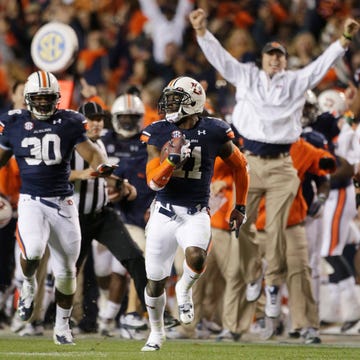
Three of the Wildest College Football Upsets Ever

Prada’s Space-Age Sailing
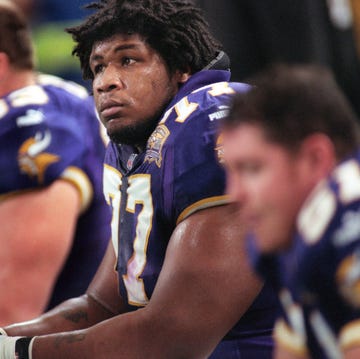
Korey Stringer was the NFL's Enlightened Man

Deion Sanders: Before He Was Coach Prime

Vince Lombardi: Pro Football’s Toughest Coach

Here's How to Watch Sunday Night Football
Jamaica's Usain Bolt is an Olympic legend who has been called "the fastest man alive" for smashing world records and winning multiple gold medals at the 2008, 2012 and 2016 Summer Games.
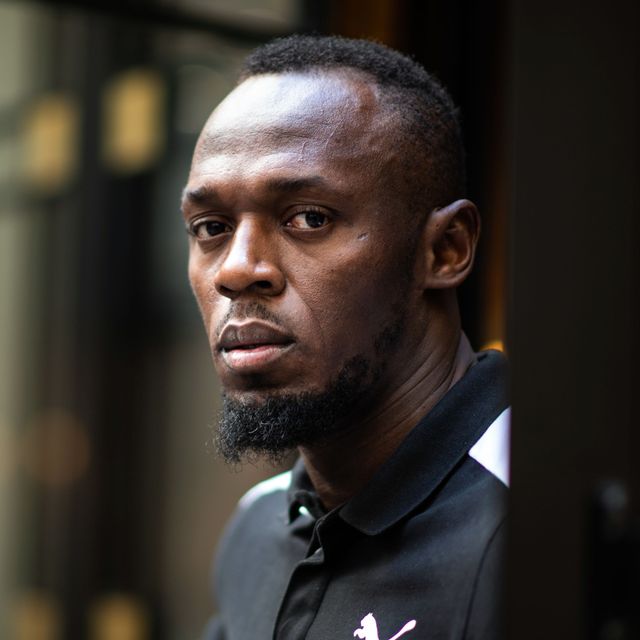
1986–present

Who Is Usain Bolt?
Quick facts, childhood and early successes, professional track and field, olympic career, records and awards, 'triple-triple' and loss of gold medal, other races, injury and retirement, soccer career, personal life and daughter.
Jamaican sprinter Usain Bolt was dubbed "the fastest man alive" after winning three gold medals at the 2008 Olympic Games in Beijing, China, and becoming the first man in Olympic history to win both the 100- and 200-meter races in record times. Bolt also won three Olympic gold medals at the 2012 Summer Olympic Games in London, along the way notching an Olympic-record time of 9.63 seconds in the 100 meters, making him the first man in history to set three world records in Olympic competition. He made history again at the 2016 Summer Games in Rio with gold medals in the 100- and 200-meter races and 4x100-meter relay; the wins gave him a "triple-triple" — three golds over three consecutive Olympics — though he later was stripped of one of the relay golds because of a teammate's doping violation.
FULL NAME: Usain Bolt BORN: August 21, 1986 BIRTHPLACE: Trelawny, Jamaica CHILDREN: Daughter ASTROLOGICAL SIGN: Leo
Bolt was born on August 21, 1986, in Jamaica. Both a standout cricket player and a sprinter early on, Bolt's natural speed was noticed by coaches at school, and he began to focus solely on sprinting under the tutelage of Pablo McNeil, a former Olympic sprint athlete. (Glen Mills would later serve as Bolt's coach and mentor.) As early as age 14, Bolt was wowing fans with his lightning speed, and he won his first high school championship medal in 2001, taking the silver in the 200-meter race.
At the age of 15, Bolt took his first shot at success on the world stage at the 2002 World Junior Championships in Kingston, Jamaica, where he won the 200-meter dash, making him the youngest world-junior gold medalist ever. Bolt's feats impressed the sports world, and he received the International Association of Athletics Foundation’s Rising Star Award that year, boosting the recognition of a young man soon to be known as "Lightning Bolt."
At the Berlin 2009 World Championships, Bolt set a world record time of 9.58 seconds for the 100m race, notching a top speed of 27.8 miles per hour (44.72 kilometers per hour) between meters 60 and 80, with an average speed of 23.5 mph.
Despite a nagging hamstring injury, Bolt was chosen for the Jamaican Olympic squad for the 2004 Athens Olympics. He was eliminated in the first round of the 200 meters, though, again hampered by injury.
Bolt reached the world Top 5 rankings in 2005 and 2006. Unfortunately, injuries continued to plague the 6'5" sprinter, preventing him from completing a full professional season.
In 2007, Bolt broke the national 200-meter record held for over 30 years by Donald Quarrie, and earned two silver medals at the World Championships in Osaka, Japan. These medals boosted Bolt's desire to run, and he took a more serious stance toward his career.
At the 2008 Beijing Summer Olympics, Bolt ran the 100-meter and 200-meter events. In the 100-meter final leading up to the Games, he broke the world record, winning in 9.69 seconds. Not only was the record set without a favorable wind, but he also visibly slowed down to celebrate before he finished (and his shoelace was untied), an act that aroused much controversy later on. He went on to win three gold medals and break three world records in Beijing.
At the 2012 Summer Olympic Games, held in London, Bolt won his fourth Olympic gold medal in the men's 100-meter race, beating rival Yohan Blake, who won silver in the event. Bolt ran the race in 9.63 seconds, a new Olympic record. The win marked Bolt's second consecutive gold medal in the 100. He went on to compete in the men's 200, claiming his second consecutive gold medal in that race as well. He became the first man to win both the 100 and 200 in consecutive Olympic Games, as well as the first man to ever win back-to-back gold medals in double sprints. Bolt's accomplishments made him the first man in history to set three world records in a single Olympic Games competition.
Bolt returned to Olympic glory at the 2016 Summer Olympic Games when he won gold in the 100-meter race, making him the the first athlete to win three successive titles in the event. He finished the race in 9.81 seconds with American runner and rival Justin Gatlin, who took silver, 0.08 seconds behind him.
“This is why I came here, to the Olympics, to prove to the world that I’m the best — again,” he told reporters at a news conference. “It always feels good to go out on top, you know what I mean?”
He continued his Olympic winning streak, taking gold in the 200 meters in 19.78 seconds. "What else can I do to prove I am the greatest?" Bolt said in an interview with BBC Sport . ”I'm trying to be one of the greatest, to be among [Muhammad] Ali and Pelé . I have made the sport exciting, I have made people want to see the sport. I have put the sport on a different level."
The "fastest man alive" remained undefeated in what he said would be the last race of his Olympic career, the 4x100-meter relay, which he ran with teammates Blake, Asafa Powell and Nickel Ashmeade. Anchoring the race, Bolt led the Jamaican team to gold, crossing the finish line in 37.27 seconds. It was the third consecutive gold medal win for Bolt in Rio.
In an interview with CBS News , Bolt detailed his pride over his 2012 performance: "It's what I came here to do. I'm now a legend. I'm also the greatest athlete to live. I've got nothing left to prove."
Bolt is an 11-time world champion. He holds the world records in races for 100 meters, at 9.58 seconds, and 200 meters, at 19.19 seconds, both of which he set at the 2009 Berlin World Athletics Championships. Over the course of his career, Bolt has received numerous awards, including the IAAF World Athlete of the Year (twice), Track & Field Athlete of the Year and Laureus Sportsman of the Year.
Participating in the 2008, 2012 and 2016 summer Olympic Games, Bolt completed a "triple-triple," with a total of nine gold medals earned in the 100-meter, 200-meter and 4x100-meter relay races. In doing so, Bolt joined just two other triple-triple runners: Paavo Nurmi of Finland (in 1920, 1924 and 1928) and Carl Lewis of the United States (in 1984, 1988, 1992 and 1996). However in January 2017, the International Olympic Committee stripped Bolt of one of these medals, for the 2008 4x100-meter relay, because his teammate Nesta Carter was found guilty of a doping violation.
Bolt took back the 100-meter world title on August 11, 2013, after having lost the title in 2011. Although Bolt didn't strike his signature "lightning bolt" pose after the race, his winning image still caused a stir, with lightning striking just as he crossed the finish line.
In 2015, Bolt faced some challenges: He came in second at the Nassau IAAF World Relays in May, but secured an individual win in the 200-meter event at the Ostrava Golden Spike event that same month. He also dominated the 200-meter race at the New York Addias Grand Prix that June. Trouble with his pelvic muscles forced him to withdraw from two races, though Bolt made a comeback that July with a 100-meter win at London's Anniversary Games.
In 2017, Bolt faced challenges on the track at the World Athletics Championships. He finished third in the men's 100 meters, taking home the bronze medal behind Christian Coleman, who won silver, and Gatlin, who took home the gold. It was the first time that Bolt had been beaten at the World Athletics Championships since 2007. His struggles didn't end there: In the 4x100-meter relay, which many believed would be Bolt's final race, he collapsed from a hamstring injury and had to cross the finish line with the help of his teammates.
In August 2017, following the World Athletics Championships, Bolt announced his retirement from track and field. “For me I don’t think one championship is going to change what I’ve done,” he said at a press conference. “I personally won’t be one of those persons to come back.”
Bolt had long talked about eventually making a career in soccer. In August 2017, following his retirement from track and field, he planned to join Manchester United for a charity game against Barcelona, but he had to miss the match due to his hamstring injury. In September, Bolt said he was already in talks with several pro soccer teams, including Manchester United. “We have a lot of offers from different teams, but I have to get over my injury first and then take it from there,” he told reporters.
In October, Bolt reaffirmed his commitment to playing soccer. "For me it's a personal goal. I don't care what people really think about it. I'm not going to lie to myself. I'm not going to be stupid," he told reporters at the U.S. Formula One Grand Prix. "If I go out there and feel I can do this then I will give it a try. It's a dream and another chapter of my life. If you have a dream that you always wanted to do, why not try and see where it will go."
Bolt began training with the Central Coast Mariners of the Australian A-League in summer 2018 and scored two goals in a preseason match in October, but left shortly afterward when he was unable to agree to contract terms with the club.
The sprinter published the memoir My Story: 9:58: The World’s Fastest Man in 2010, which was reissued two years later as The Fastest Man Alive: The True Story of Usain Bolt . He followed in 2013 with Faster Than Lightning: My Autobiography .
In August 2016, People magazine confirmed that Usain Bolt was dating Jamaican model Kasi Bennett. Bolt has been private about their relationship, but he told a journalist in January 2017 that they had been dating for almost three years. In May 2020, it was revealed that Bennett had given birth to a daughter.
- It’s what I came here to do. I’m now a legend. I’m also the greatest athlete to live. I’ve got nothing left to prove.
- When I was young, I didn’t really think about anything other than sports.
- I was slightly worried about my start. I didn’t want to false start again. So I think I sat in the blocks a little bit. It wasn’t the best reaction in the world, but I executed and that was the key.
- In training, [Yohan Blake] always works hard and pushes me.
- The trials woke me up... Yohan [Blake] gave me a wake-up call. He knocked on my door and said, “Usain, this is the Olympic year, wake up.” After that, I refocused and got my head together.
- My coach said, “Stop worrying about your start, the best of your race is at the end, that's where you rule.” So I stopped worrying about my start and I executed, so it worked.
- Some of you guys doubted me. I just had to show you I was the greatest.
- I just wanted to make Jamaica proud. I hope they were all standing up singing the national anthem.
- For everybody who was in the race tonight, the four other fastest guys in the world, it was a real honor for me.
- I was happy. When I went out in the first run, I felt, “I can do this.”
- I’m a living legend.
- I’m just going out there all the time to do my thing and show the world I’m probably the best.
Fact Check: We strive for accuracy and fairness. If you see something that doesn’t look right, contact us !
The Biography.com staff is a team of people-obsessed and news-hungry editors with decades of collective experience. We have worked as daily newspaper reporters, major national magazine editors, and as editors-in-chief of regional media publications. Among our ranks are book authors and award-winning journalists. Our staff also works with freelance writers, researchers, and other contributors to produce the smart, compelling profiles and articles you see on our site. To meet the team, visit our About Us page: https://www.biography.com/about/a43602329/about-us
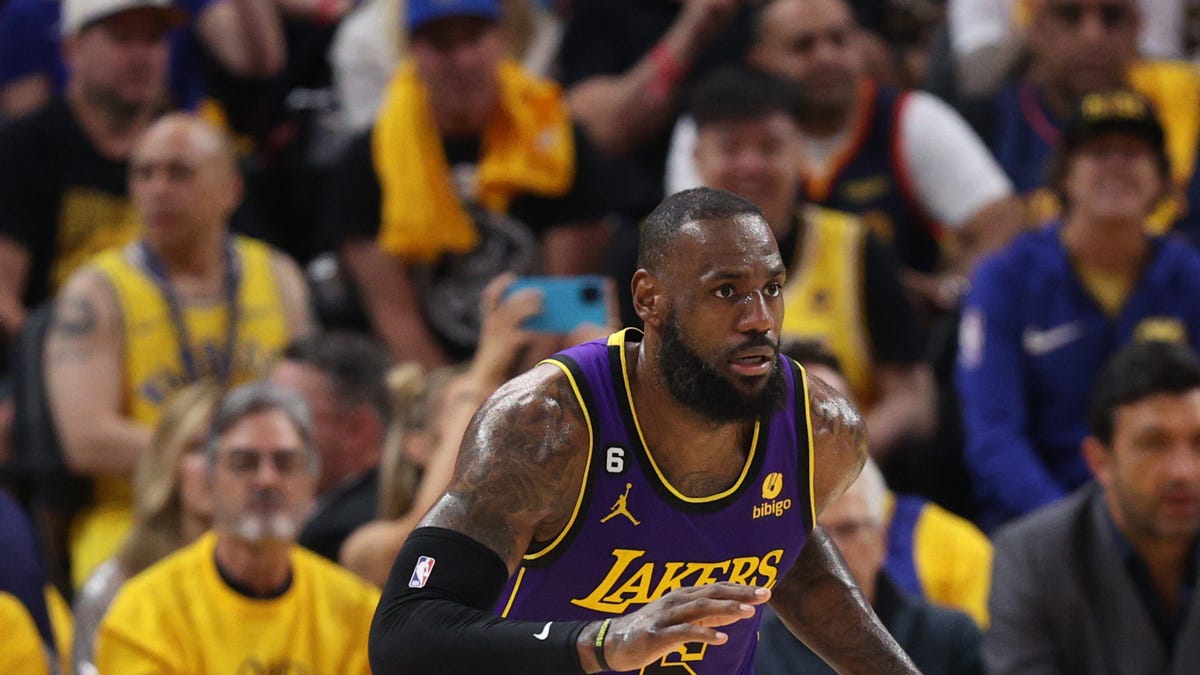
Rafael Nadal
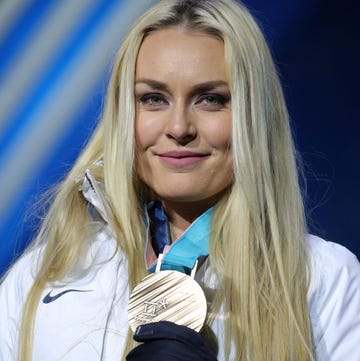
Lindsey Vonn

Suni Lee’s Lip Combo Includes These 3 Products

How to Watch the 2024 Olympics Live and Online
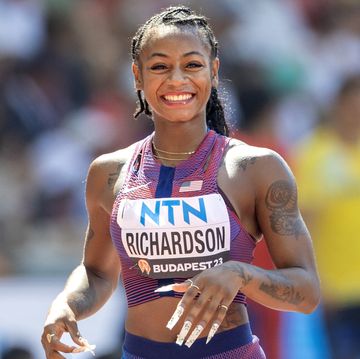
Sha’Carri Richardson

Simone Biles

Katie Ledecky

6 Breakout Stars at the Paris Olympics

Simone Biles’ Goat Necklace Was Custom-Made

Simone Biles’ Huge Net Worth Isn’t From Gymnastics

Registration
Biography of Usain Bolt
Early life and career, early success and world championships, olympic success and retirement.
Usain St. Leo Bolt, a Jamaican sprinter, is considered one of the fastest - if not the fastest - men in the world. He is a three-time Olympic champion, an eight-time Olympic gold medalist, and an eleven-time world champion, holding the record for the most victories in these competitions among men. His name, 'Usain Bolt,' is synonymous with the word 'speed,' as he has set numerous world records throughout his career and shows no signs of slowing down.

Usain Bolt was born in Sherwood Content, Trelawny, Jamaica. His parents ran a small grocery store, and Bolt spent his free time playing cricket and football on the streets with his brother. Bolt's potential as a sprinter began to show in his school years, and by the age of 12, he was the fastest runner in his school on the 100-meter distance.

Although Bolt changed schools, he continued his involvement in sports. After experimenting with different disciplines, he decided to focus on track and field at the recommendation of his coach. Under the guidance of professional trainers, including former Olympic sprinter Pablo McNeil, Bolt developed his innate abilities and showcased increasingly impressive results.

Despite his dedication to sports, Bolt was known for his lighthearted approach to training and his love for practical jokes. However, his talent and determination were undeniable, and he made his international debut at the CARIFTA Games in 2001, where he set a personal record and won a silver medal in the 400 meters event. The same year, Bolt participated in the IAAF World Youth Championships in Debrecen, Hungary, setting a new record in the 200 meters race.

In 2002, the World Junior Championships took place in Jamaica, providing Bolt with an opportunity to showcase his talent. At the age of 15, he won the gold medal in the 200 meters race, becoming the youngest-ever gold medalist in the junior world championships. Despite his nerves before the race, Bolt's performance on the track demonstrated his exceptional abilities.
In the following years, Bolt continued to excel in his sport. At the CARIFTA Games in 2003, he won four gold medals and received the "Austin Sealy award" for the Most Outstanding Athlete. In the World Youth Championships, he won another gold medal and set a new championship record in the 200 meters event.
Despite receiving recognition for his potential, Bolt's greatest victories were yet to come. Focusing on the 200 meters distance, Bolt equaled the junior record set by Roy Martin, attracting the attention of the press. His popularity grew, both internationally and in his homeland.
Despite health issues that prevented him from competing in the World Championships, Bolt trained relentlessly and prepared for the Beijing Olympics. In the final of the 100 meters race, he set a new world record, confidently securing the gold medal. His victory became even more remarkable when considering the unfastened shoelace, lack of wind assistance, and his deliberate slowdown at the end of the race.
Two days later, Bolt won the gold medal in the 200 meters race, breaking yet another record. He completed the Olympics with a third gold medal in the 4x100 meters relay. Bolt's success continued at the London Olympics, where he defended both of his gold medals and added another gold in the 4x100 meters relay, making him the first person to achieve this feat.
On February 2, 2017, Bolt announced his plan to retire after the 2017 World Championships. Following his retirement from track and field, Bolt pursued his dream of becoming a professional footballer. On February 26, 2018, he signed a professional contract with the South African football club, Mamelodi Sundowns. He later debuted for the Norwegian football club, Stromsgodset, and joined the Australian football team, Central Coast Mariners.
While his football career did not reach the same heights as his track and field success, Bolt's contributions to both sports have left an indelible mark. His incredible speed, numerous world records, and charismatic personality have made Usain Bolt a legendary figure in the world of athletics.
© BIOGRAPHS
Contrary to popular opinin, journalism is thriving—but too many outlets feature the same bylines they've published for decades. Longreads prides itself on publishing writers at every stage of their career, from all over the world. Who's the next great storyteller? Let's find them together.
Support a vibrant ecosystem of writers.
The Best of the Web—in Your Inbox
Every day we scour the internet for the best longform writing, and every day we send you our editors' picks. Join 100,000 newsletter subscribers—and don't miss that story everyone is talking about.
- Daily Updates
- Weekly Top 5

Join Longreads today!
Register with Longreads for free and get access to our editors' picks collecting the best stories on the web, as well as our award-winning original writing.
Our privacy policy can be found here.
Thank you for registering!
An account was already registered with this email. Please check your inbox for an authentication link.

Longreads : The best longform stories on the web
Biography of Usain Bolt, Mutant
In just two years, he has demolished the 100-meter dash world records with times that are superhuman — literally thirty years ahead of what they historically should be. So what if the greatest athlete alive decided to actually get serious?
Support Longreads
By clicking submit, you agree to share your email address with the site owner and Mailchimp to receive marketing, updates, and other emails from the site owner. Use the unsubscribe link in those emails to opt out at any time.
Enter the code sent to your email.
Email address
Enter your password
Sign in by entering the code we sent to , or clicking the magic link in the email.
Complete your transaction
- Milano Cortina 2026
- Brisbane 2032
- Olympic Refuge Foundation
- Olympic Games
- Olympic Channel
- Let's Move
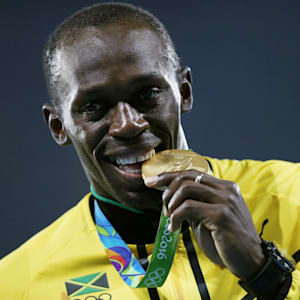
Usain Bolt has been, quite simply, the face of the last three Olympic Games. To win the event’s blue riband event, the 100m, just once, guarantees Olympic immortality. To do it three times at consecutive Games, and add the 200m and 4x100m relay titles to the mix, gives him a good case to be considered the greatest athlete of all time. Still only 33, he is a living legend. Add real charm and humour to the mix, and Bolt has been the superstar that the Games needed over the last decade and a bit.
Bolt was born on 21 August 1986 in Sherwood Content, Jamaica. He grew up as a sports-obsessed kid, excelling in football and cricket. At high school, his cricket coach encouraged him to try athletics seriously. It was a good decision, By the age of 16, in 2002, he was world junior champion.
By 2007, he was the fastest man in history, setting his first 100m world record, and a year later, at the Beijing 2008 Olympic Games, he rose to international superstardom. In China, Bolt triumphed in the men’s 100m sprint, and then added the 200m and 4x100m title to secure a legendary triple. He broke the world record in all three events.
Further magic was to follow. At London 2012 he bagged the 100m again (beating his own Olympic record), added the 200m title, and then teamed up with the other Jamaican sprinters to take the 4x100m. A ‘double triple’ had been secured. That became the ‘triple triple’ at Rio 2016. Despite entering the Games not quite looking his best, Bolt once again secured all three titles – 100m, 200m and 4x100m – to make history once more.
Bolt had to return his 4x100m medal for Beijing 2008 after his teammate Nestor Carter was retroactively banned for a doping violation, but his personal record remains impeccable – and his sprinting record haul surely unbeatable.
Since his retirement in 2018, Bolt has remained extremely popular and high profile. He attempted to become a professional footballer – training with sides like Borussia Dortmund and Central Coast Mariners, as well as playing at Soccer Aid – and has got several business interests, including a new range of electric scooters.
Always a hit at personal appearances – he cropped up at the 2019 Super Bowl, where he equalled the fastest ever 40-yard dash – it seems like there will be a lot more to come from Bolt. The main challenge for the Olympic Games over the next decade? Finding another superstar of his stature.
I stopped worrying about the start. The end is what’s important.”
A stroke of luck
The vault, treasures of the olympics | full length, greg and jeanette go behind the scenes at the olympic museum | the vault, usain bolt replays, olympic results.
Athlete Olympic Results Content
You may like
Ask the publishers to restore access to 500,000+ books.

Internet Archive Audio

- Grateful Dead
- Old Time Radio
- 78 RPMs and Cylinder Recordings
- Audio Books & Poetry
- Computers, Technology and Science
- Music, Arts & Culture
- News & Public Affairs
- Spirituality & Religion
- Radio News Archive

- Flickr Commons
- Occupy Wall Street Flickr
- NASA Images
- Solar System Collection
- Ames Research Center

- All Software
- Old School Emulation
- MS-DOS Games
- Historical Software
- Classic PC Games
- Software Library
- Kodi Archive and Support File
- Vintage Software
- CD-ROM Software
- CD-ROM Software Library
- Software Sites
- Tucows Software Library
- Shareware CD-ROMs
- Software Capsules Compilation
- CD-ROM Images
- ZX Spectrum
- DOOM Level CD

- Smithsonian Libraries
- FEDLINK (US)
- Lincoln Collection
- American Libraries
- Canadian Libraries
- Universal Library
- Project Gutenberg
- Children's Library
- Biodiversity Heritage Library
- Books by Language
- Additional Collections

- Prelinger Archives
- Democracy Now!
- Occupy Wall Street
- TV NSA Clip Library
- Animation & Cartoons
- Arts & Music
- Computers & Technology
- Cultural & Academic Films
- Ephemeral Films
- Sports Videos
- Videogame Videos
- Youth Media
Search the history of over 916 billion web pages on the Internet.
Mobile Apps
- Wayback Machine (iOS)
- Wayback Machine (Android)
Browser Extensions
Archive-it subscription.
- Explore the Collections
- Build Collections
Save Page Now
Capture a web page as it appears now for use as a trusted citation in the future.
Please enter a valid web address
- Donate Donate icon An illustration of a heart shape
Faster than lightning : my autobiography
Bookreader item preview, share or embed this item, flag this item for.
- Graphic Violence
- Explicit Sexual Content
- Hate Speech
- Misinformation/Disinformation
- Marketing/Phishing/Advertising
- Misleading/Inaccurate/Missing Metadata
![[WorldCat (this item)] [WorldCat (this item)]](https://archive.org/images/worldcat-small.png)
comment Reviews
904 Previews
DOWNLOAD OPTIONS
No suitable files to display here.
IN COLLECTIONS
Uploaded by station61.cebu on November 19, 2020
SIMILAR ITEMS (based on metadata)

IMAGES
VIDEO
COMMENTS
Usain Bolt (born August 21, 1986, Trelawny parish, Jamaica) is a Jamaican sprinter who won gold medals in the 100-meter and 200-meter races in an unprecedented three straight Olympic Games (2008, 2012, and 2016). He is widely considered the greatest sprinter of all time.
Biography of Usain Bolt, Mutant In just two years, he has demolished the 100-meter dash world records with times that are superhuman — literally thirty years ahead of what they historically...
Usain St. Leo Bolt OJ CD (/ ˈjuːseɪn /; [12] born 21 August 1986) is a Jamaican retired sprinter who is widely considered to be the greatest sprinter of all time. [13][14][15] He is an eight-time Olympic gold medalist and the world record holder in the 100 metres, 200 metres, and 4 × 100 metres relay.
Jamaican sprinter Usain Bolt was dubbed "the fastest man alive" after winning three gold medals at the 2008 Olympic Games in Beijing, China, and becoming the first man in Olympic history to win...
Usain St. Leo Bolt, a Jamaican sprinter, is considered one of the fastest - if not the fastest - men in the world. He is a three-time Olympic champion, an eight-time Olympic gold medalist, and an eleven-time world champion, holding the record for the most victories in these competitions among men.
In just two years, he has demolished the 100-meter dash world records with times that are superhuman — literally thirty years ahead of what they historically should be. So what if the greatest athlete alive decided to actually get serious?
Usain Bolt is undoubtedly the greatest sprinter in the history of mankind. A living legend, he has won nine gold medals in track and field events in the Olympics; a feat which no other person had achieved before.
Visit Usain Bolt Biography's profile, read the full biography, see the number of Olympic medals, watch videos and read all the latest news. Click here for more.
In this, his full autobiography, Usain tells his story in his own words: from humble beginnings in Jamaica, to international stardom at Beijing and on to the new heights of superstardom he has reached since lighting up London 2012.
Are you curious about the incredible journey of Usain Bolt, the fastest man alive? In this article, we will delve into the inspiring biography of the legendary sprinter, from his humble beginnings in Jamaica to his record-breaking achievements on the track.